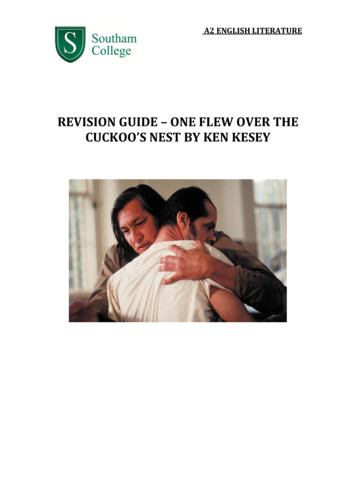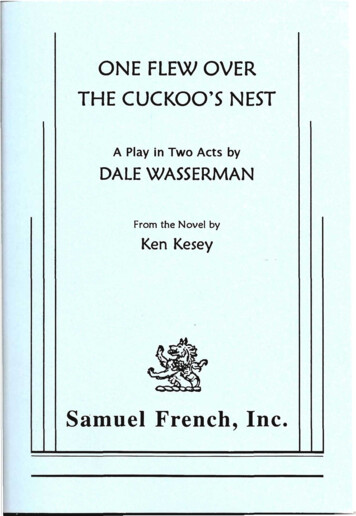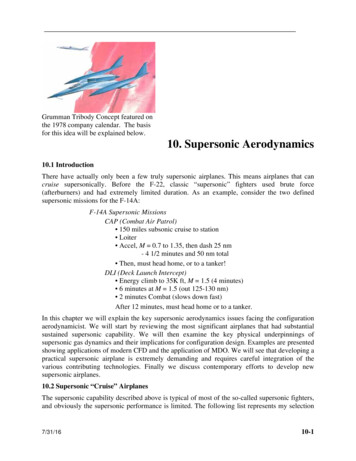
Transcription
An mdf ProofreadABEB Ver. 2.5“YOU FEEL THIS BOOK ALONG YOUR SPINE ”- Kansas City StarTired of weeding peas at a penal farm, the tough, freewheelingMcMurphy feigns insanity for a chance at the softer life of a mentalinstitution. But he gets more than he’s bargained for, much more. Heis committed to the care of Big Nurse - a full-breasted, stiff-gaitedtyrant who rules over her charges with chilling authority.Her ward is a citadel of discipline. Strong-arm orderlies stand readyto quell even the feeblest insurrection. Her patients long ago gave upthe struggle to assert themselves. Cowed, docile, they havesurrendered completely to her unbridled authority.Now, into their ranks charges McMurphy. The gambling Irishmansees at once what Big Nurse’s game is. Appalled by the timidity of hisfellow patients, he begins his one man campaign to render herpowerless. First in fun, and then in dire earnestness, he sets out tocreate havoc on her well-run ward to make the gray halls ring withlaughter, and anger, and life.Copyright 1962 - Ken KeseyThis is an authorized reprint of a hardcover edition published by TheViking Press, Inc.One Flew Over The Cuckoo’s NestKen Kesey
To Vik LovellWho told me dragons did not exist,then led me to their lairs one flew east, one flew west,One flew over the cuckoo’s nest.Children’s folk rhyme
Part 1
1They’re out there.Black boys in white suits up before me to commit sex acts in thehall and get it mopped up before I can catch them.They’re mopping when I come out the dorm, all three of them sulkyand hating everything, the time of day, the place they’re at here, thepeople they got to work around. When they hate like this, better ifthey don’t see me. I creep along the wall quiet as dust in my canvasshoes, but they got special sensitive equipment detects my fear andthey all look up, all three at once, eyes glittering out of the black faceslike the hard glitter of radio tubes out of the back of an old radio.“Here’s the Chief. The soo-pah Chief, fellas. Ol’ Chief Broom. Hereyou go, Chief Broom ”Stick a mop in my hand and motion to the spot they aim for me toclean today, and I go. One swats the backs of my legs with a broomhandle to hurry me past.“Haw, you look at ’im shag it? Big enough to eat apples off my headan’ he mine me like a baby.”They laugh and then I hear them mumbling behind me, heads closetogether. Hum of black machinery, humming hate and death and otherhospital secrets. They don’t bother not talking out loud about theirhate secrets when I’m nearby because they think I’m deaf and dumb.Everybody thinks so. I’m cagey enough to fool them that much. If mybeing half Indian ever helped me in any way in this dirty life, it helpedme being cagey, helped me all these years.I’m mopping near the ward door when a key hits it from the otherside and I know it’s the Big Nurse by the way the lockworks cleave tothe key, soft and swift and familiar she been around locks so long. Sheslides through the door with a gust of cold and locks the door behindher and I see her fingers trail across the polished steel - tip of eachfinger the same color as her lips. Funny orange. Like the tip of asoldering iron. Color so hot or so cold if she touches you with it youcan’t tell which.She’s carrying her woven wicker bag like the ones the Umpquatribe sells out along the hot August highway, a bag shape of a tool boxwith a hemp handle. She’s had it all the years I been here. It’s a looseweave and I can see inside it; there’s no compact or lipstick or womanstuff, she’s got that bag full of thousand parts she aims to use in herduties today - wheels and gears, cogs polished to a hard glitter, tinypills that gleam like porcelain, needles, forceps, watchmakers’ pliers,
rolls of copper wire She dips a nod at me as she goes past. I let the mop push me backto the wall and smile and try to foul her equipment up as much aspossible by not letting her see my eyes - they can’t tell so much aboutyou if you got your eyes closed.In my dark I hear her rubber heels hit the tile and the stuff in herwicker bag clash with the jar of her walking as she passes me in thehall. She walks stiff. When I open my eyes she’s down the hall aboutto turn into the glass Nurses’ Station where she’ll spend the day sittingat her desk and looking out her window and making notes on whatgoes on out in front of her in the day room during the next eighthours. Her face looks pleased and peaceful with the thought.Then she sights those black boys. They’re still down theretogether, mumbling to one another. They didn’t hear her come on theward. They sense she’s glaring down at them now, but it’s too late.They should of knew better’n to group up and mumble together whenshe was due on the ward. Their faces bob apart, confused. She goesinto a crouch and advances on where they’re trapped in a huddle atthe end of the corridor. She knows what they been saying, and I cansee she’s furious clean out of control. She’s going to tear the blackbastards limb from limb, she’s so furious. She’s swelling up, swells tillher back’s splitting out the white uniform and she’s let her armssection out long enough to wrap around the three of them five, sixtimes. She looks around her with a swivel of her huge head. Nobodyup to see, just old Broom Bromden the half-breed Indian back therehiding behind his mop and can’t talk to call for help. So she really letsherself go and her painted smile twists, stretches to an open snarl, andshe blows up bigger and bigger, big as a tractor, so big I can smell themachinery inside the way you smell a motor pulling too big a load. Ihold my breath and figure, My God this time they’re gonna do it! Thistime they let the hate build up too high and overloaded and they’regonna tear one another to pieces before they realize what they’redoing!But just as she starts crooking those sectioned arms around theblack boys and they go to ripping at her underside with the mophandles, all the patients start coming out of the dorms to check onwhat’s the hullabaloo, and she has to change back before she’s caughtin the shape of her hideous real self. By the time the patients get theireyes rubbed to where they can halfway see what the racket’s about, allthey see is the head nurse, smiling and calm and cold as usual, tellingthe black boys they’d best not stand in a group gossiping when it isMonday morning and there is such a lot to get done on the firstmorning of the week “ mean old Monday morning, you know, boys ”
“Yeah, Miz Ratched ”“ and we have quite a number of appointments this morning, soperhaps, if your standing here in a group talking isn’t too urgent ”“Yeah, Miz Ratched ”She stops and nods at some of the patients come to stand aroundand stare out of eyes all red and puffy with sleep. She nods once toeach. Precise, automatic gesture. Her face is smooth, calculated, andprecision-made, like an expensive baby doll, skin like flesh-coloredenamel, blend of white and cream and baby-blue eyes, small nose,pink little nostrils - everything working together except the color onher lips and fingernails, and the size of her bosom. A mistake wasmade somehow in manufacturing, putting those big, womanly breastson what would of otherwise been a perfect work, and you can see howbitter she is about it.The men are still standing and waiting to see what she was ontothe black boys about, so she remembers seeing me and says, “Andsince it is Monday, boys, why don’t we get a good head start on theweek by shaving poor Mr. Bromden first this morning, before the afterbreakfast rush on the shaving room, and see if we can’t avoid some ofthe - ah - disturbance he tends to cause, don’t you think?”Before anybody can turn to look for me I duck back in the mopcloset, jerk the door shut dark after me, hold my breath. Shavingbefore you get breakfast is the worst time. When you got somethingunder your belt you’re stronger and more wide awake, and thebastards who work for the Combine aren’t so apt to slip one of theirmachines in on you in place of an electric shaver. But when you shavebefore breakfast like she has me do some mornings - six-thirty in themorning in a room all white walls and white basins, and long-tubelights in the ceiling making sure there aren’t any shadows, and facesall round you trapped screaming behind the mirrors - then whatchance you got against one of their machines?I hide in the mop closet and listen, my heart beating in the dark,and I try to keep from getting scared, try to get my thoughts offsomeplace else - try to think back and remember things about thevillage and the big Columbia River, think about ah one time Papa andme were hunting birds in a stand of cedar trees near The Dalles Butlike always when I try to place my thoughts in the past and hide there,the fear close at hand seeps in through the memory. I can feel thatleast black boy out there coming up the hall, smelling out for my fear.He opens out his nostrils like black funnels, his outsized head bobbingthis way and that as he sniffs, and he sucks in fear from all over theward. He’s smelling me now, I can hear him snort. He don’t knowwhere I’m hid, but he’s smelling and he’s hunting around. I try to keep
still (Papa tells me to keep still, tells me that the dog senses a birdsomewheres right close. We borrowed a pointer dog from a man in TheDalles. All the village dogs are no-’count mongrels, Papa says, fish-guteaters and no class a-tall; this here dog, he got insteek! I don’t sayanything, but I already see the bird up in a scrub cedar, hunched in agray knot of feathers. Dog running in circles underneath, too muchsmell around for him to point for sure. The bird safe as long as hekeeps still. He’s holding out pretty good, but the dog keeps sniffingand circling, louder and closer. Then the bird breaks, feathersspringing, jumps out of the cedar into the birdshot from Papa’s gun.)The least black boy and one of the bigger ones catch me before Iget ten steps out of the mop closet, and drag me back to the shavingroom. I don’t fight or make any noise. If you yell it’s just tougher onyou. I hold back the yelling. I hold back till they get to my temples.I’m not sure it’s one of those substitute machines and not a shaver tillit gets to my temples; then I can’t hold back. It’s not a will-powerthing any more when they get to my temples. It’s a button, pushed,says Air Raid Air Raid, turns me on so loud it’s like no sound,everybody yelling at me, hands over their ears from behind a glasswall, faces working around in talk circles but no sound from themouths. My sound soaks up all other sound. They start the fogmachine again and it’s snowing down cold and white all over me likeskim milk, so thick I might even be able to hide in it if they didn’t havea hold on me. I can’t see six inches in front of me through the fog andthe only thing I can hear over the wail I’m making is the Big Nursewhoop and charge up the hall while she crashes patients outta her waywith that wicker bag. I hear her coming but I still can’t hush myhollering. I holler till she gets there. They hold me down while shejams wicker bag and all into my mouth and shoves it down with a mophandle.(A bluetick hound bays out there in the fog, running scared and lostbecause he can’t see. No tracks on the ground but the ones he’smaking, and he sniffs in every direction with his cold red-rubber noseand picks up no scent but his own fear, fear burning down into him likesteam.) It’s gonna burn me just that way, finally telling about all this,about the hospital, and her, and the guys - and about McMurphy. Ibeen silent so long now it’s gonna roar out of me like floodwaters andyou think the guy telling this is ranting and raving my God; you thinkthis is too horrible to have really happened, this is too awful to be thetruth! But, please. It’s still hard for me to have a clear mind thinkingon it. But it’s the truth even if it didn’t happen.
2When the fog clears to where I can see, I’m sitting in the day room.They didn’t take me to the Shock Shop this time. I remember theytook me out of the shaving room and locked me in Seclusion. I don’tremember if I got breakfast or not. Probably not. I can call to mindsome mornings locked in Seclusion the black boys keep bringingseconds of everything - supposed to be for me, but they eat it instead- till all three of them get breakfast while I lie there on that peestinking mattress, watching them wipe up egg with toast. I can smellthe grease and hear them chew the toast. Other mornings they bringme cold mush and force me to eat it without it even being salted.This morning I plain don’t remember. They got enough of thosethings they call pills down me so I don’t know a thing till I hear theward door open. That ward door opening means it’s at least eighto’clock, means there’s been maybe an hour and a half I was out cold inthat Seclusion Room when the technicians could of come in andinstalled anything the Big Nurse ordered and I wouldn’t have theslightest notion what.I hear noise at the ward door, off up the hall out of my sight. Thatward door starts opening at eight and opens and closes a thousandtimes a day, kashash, click. Every morning we sit lined up on each sideof the day room, mixing jigsaw puzzles after breakfast, listen for a keyto hit the lock, and wait to see what’s coming in. There’s not a wholelot else to do. Sometimes, at the door, it’s a young resident in early sohe can watch what we’re like Before Medication. BM, they call it.Sometimes it’s a wife visiting there on high heels with her purse heldtight over her belly. Sometimes it’s a clutch of grade-school teachersbeing led on a tour by that fool Public Relation man who’s alwaysclapping his wet hands together and saying how overjoyed he is thatmental hospitals have eliminated all the old-fashioned cruelty. “What acheery atmosphere, don’t you agree?” He’ll bustle around theschoolteachers, who are bunched together for safety, clapping hishands together. “Oh, when I think back on the old days, on the filth,the bad food, even, yes, brutality, oh, I realize, ladies, that we havecome a long way in our campaign!” Whoever comes in the door isusually somebody disappointing, but there’s always a chanceotherwise, and when a key hits the lock all the heads come up likethere’s strings on them.This morning the lockworks rattle strange; it’s not a regular visitorat the door. An Escort Man’s voice calls down, edgy and impatient,“Admission, come sign for him,” and the black boys go.
Admission. Everybody stops playing cards and Monopoly, turnstoward the day-room door. Most days I’d be out sweeping the hall andsee who they’re signing in, but this morning, like I explain to you, theBig Nurse put a thousand pounds down me and I can’t budge out ofthe chair. Most days I’m the first one to see the Admission, watch himcreep in the door and slide along the wall and stand scared till theblack boys come sign for him and take him into the shower room,where they strip him and leave him shivering with the door open whilethey all three run grinning up and down the halls looking for theVaseline. “We need that Vaseline,” they’ll tell the Big Nurse, “for thethermometer.” She looks from one to the other: “I’m sure you do,”and hands them a jar holds at least a gallon, “but mind you boys don’tgroup up in there.” Then I see two, maybe all three of them in there,in that shower room with the Admission, running that thermometeraround in the grease till it’s coated the size of your finger, crooning,“Tha’s right, mothah, that’s right,” and then shut the door and turn allthe showers up to where you can’t hear anything but the vicious hissof water on the green tile. I’m out there most days, and I see it likethat.But this morning I have to sit in the chair and only listen to thembring him in. Still, even though I can’t see him, I know he’s noordinary Admission. I don’t hear him slide scared along the wall, andwhen they tell him about the shower he don’t just submit with a weaklittle yes, he tells them right back in a loud, brassy voice that he’salready plenty damn clean, thank you.“They showered me this morning at the courthouse and last nightat the jail. And I swear I believe they’d of washed my ears for me onthe taxi ride over if they coulda found the vacilities. Hoo boy, seemslike everytime they ship me someplace I gotta get scrubbed downbefore, after, and during the operation. I’m gettin’ so the sound ofwater makes me start gathering up my belongings. And get back awayfrom me with that thermometer, Sam, and give me a minute to lookmy new home over; I never been in a Institute of Psychology before.”The patients look at one another’s puzzled faces, then back to thedoor, where his voice is still coming in. Talking louder’n you’d think heneeded to if the black boys were anywhere near him. He sounds likehe’s way above them, talking down, like he’s sailing fifty yardsoverhead, hollering at those below on the ground. He sounds big. Ihear him coming down the hall, and he sounds big in the way hewalks, and he sure don’t slide; he’s got iron on his heels and he rings iton the floor like horseshoes. He shows up in the door and stops andhitches his thumbs in his pockets, boots wide apart, and stands therewith the guys looking at him.“Good mornin’, buddies.”
There’s a paper Halloween bat hanging on a string above his head;he reaches up and flicks it so it spins around.“Mighty nice fall day.”He talks a little the way Papa used to, voice loud and full of hell,but he doesn’t look like Papa; Papa was a full-blood Columbia Indian a chief - and hard and shiny as a gunstock. This guy is redheaded withlong red sideburns and a tangle of curls out from under his cap, beenneeding cut a long time, and he’s broad as Papa was tall, broad acrossthe jaw and shoulders and chest, a broad white devilish grin, and he’shard in a different kind of way from Papa, kind of the way a baseball ishard under the scuffed leather. A seam runs across his nose and onecheekbone where somebody laid him a good one in a fight, and thestitches are still in the seam. He stands there waiting, and whennobody makes a move to say anything to him he commences to laugh.Nobody can tell exactly why he laughs; there’s nothing funny going on.But it’s not the way that Public Relation laughs, it’s free and loud and itcomes out of his wide grinning mouth and spreads in rings bigger andbigger till it’s lapping against the walls all over the ward. Not like thatfat Public Relation laugh. This sounds real. I realize all of a sudden it’sthe first laugh I’ve heard in years.He stands looking at us, rocking back in his boots, and he laughsand laughs. He laces his fingers over his belly without taking histhumbs out of his pockets. I see how big and beat up his hands are.Everybody on the ward, patients, staff, and all, is stunned dumb byhim and his laughing. There’s no move to stop him, no move to sayanything. He laughs till he’s finished for a time, and he walks on intothe day room. Even when he isn’t laughing, that laughing soundhovers around him, the way the sound hovers around a big bell justquit ringing - it’s in his eyes, in the way he smiles and swaggers, in theway he talks.“My name is McMurphy, buddies, R. P. McMurphy, and I’m agambling fool.” He winks and sings a little piece of a song: “‘ andwhenever I meet with a deck a cards I lays my money down,’”and laughs again.He walks to one of the card games, tips an Acute’s cards up with athick, heavy finger, and squints at the hand and shakes his head.“Yessir, that’s what I came to this establishment for, to bring youbirds fun an’ entertainment around the gamin’ table. Nobody left inthat Pendleton Work Farm to make my days interesting any more, so Irequested a transfer, ya see. Needed some new blood. Hooee, look atthe way this bird holds his cards, showin’ to everybody in a block;man! I’ll trim you babies like little lambs.”Cheswick gathers his cards together. The redheaded man sticks his
hand out for Cheswick to shake.“Hello, buddy; what’s that you’re playin’? Pinochle? Jesus, nowonder you don’t care nothin’ about showing your hand. Don’t youhave a straight deck around here? Well say, here we go, I broughtalong my own deck, just in case, has something in it other than facecards - and check the pictures, huh? Every one different. Fifty-twopositions.”Cheswick is pop-eyed already, and what he sees on those cardsdon’t help his condition.“Easy now, don’t smudge ’em; we got lots of time, lots of gamesahead of us. I like to use my deck here because it takes at least aweek for the other players to get to where they can even see the suit ”He’s got on work-farm pants and shirt, sunned out till they’re thecolor of watered milk. His face and neck and arms are the color ofoxblood leather from working long in the fields. He’s got a primerblack motorcycle cap stuck in his hair and a leather jacket over onearm, and he’s got on boots gray and dusty and heavy enough to kick aman half in two. He walks away from Cheswick and takes off the capand goes to beating a dust storm out of his thigh. One of the blackboys circles him with the thermometer, but he’s too quick for them; heslips in among the Acutes and starts moving around shaking handsbefore the black boy can take good aim. The way he talks, his wink,his loud talk, his swagger all remind me of a car salesman or a stockauctioneer - or one of those pitchmen you see on a sideshow stage,out in front of his flapping banners, standing there in a striped shirtwith yellow buttons, drawing the faces off the sawdust like a magnet.“What happened, you see, was I got in a couple of hassles at thework farm, to tell the pure truth, and the court ruled that I’m apsychopath. And do you think I’m gonna argue with the court? Shoo,you can bet your bottom dollar I don’t. If it gets me outta thosedamned pea fields I’ll be whatever their little heart desires, be itpsychopath or mad dog or werewolf, because I don’t care if I neversee another weedin’ hoe to my dying day. Now they tell me apsychopath’s a guy fights too much and fucks too much, but they ain’twholly right, do you think? I mean, whoever heard tell of a man gettin’too much poozle? Hello, buddy, what do they call you? My name’sMcMurphy and I’ll bet you two dollars here and now that you can’t tellme how many spots are in that pinochle hand you’re holding don’tlook. Two dollars; what d’ya say? God damn, Sam! can’t you wait halfa minute to prod me with that damn thermometer of yours?”
3The new man stands looking a minute, to get the set-up of the dayroom.One side of the room younger patients, known as Acutes becausethe doctors figure them still sick enough to be fixed, practice armwrestling and card tricks where you add and subtract and count downso many and it’s a certain card. Billy Bibbit tries to learn to roll a tailormade cigarette, and Martini walks around, discovering things under thetables and chairs. The Acutes move around a lot. They tell jokes toeach other and snicker in their fists (nobody ever dares let loose andlaugh, the whole staff’d be in with notebooks and a lot of questions)and they write letters with yellow, runty, chewed pencils.They spy on each other. Sometimes one man says something abouthimself that he didn’t aim to let slip, and one of his buddies at thetable where he said it yawns and gets up and sidles over to the big logbook by the Nurses’ Station and writes down the piece of informationhe heard - of therapeutic interest to the whole ward, is what the BigNurse says the book is for, but I know she’s just waiting to get enoughevidence to have some guy reconditioned at the Main Building,overhauled in the head to straighten out the trouble.The guy that wrote the piece of information in the log book, he getsa star by his name on the roll and gets to sleep late the next day.Across the room from the Acutes are the culls of the Combine’sproduct, the Chronics. Not in the hospital, these, to get fixed, but justto keep them from walking around the streets giving the product a badname. Chronics are in for good, the staff concedes. Chronics aredivided into Walkers like me, can still get around if you keep them fed,and Wheelers and Vegetables. What the Chronics are - or most of us are machines with flaws inside that can’t be repaired, flaws born in, orflaws beat in over so many years of the guy running head-on into solidthings that by the time the hospital found him he was bleeding rust insome vacant lot.But there are some of us Chronics that the staff made a couple ofmistakes on years back, some of us who were Acutes when we camein, and got changed over. Ellis is a Chronic came in an Acute and gotfouled up bad when they overloaded him in that filthy brain-murderingroom that the black boys call the “Shock Shop.” Now he’s nailedagainst the wall in the same condition they lifted him off the table forthe last time, in the same shape, arms out, palms cupped, with thesame horror on his face. He’s nailed like that on the wall, like a stuffed
trophy. They pull the nails when it’s time to eat or time to drive him into bed when they want him to move so’s I can mop the puddle wherehe stands. At the old place he stood so long in one spot the piss atethe floor and beams away under him and he kept falling through to theward below, giving them all kinds of census headaches down therewhen roll check came around.Ruckly is another Chronic came in a few years back as an Acute,but him they overloaded in a different way: they made a mistake inone of their head installations. He was being a holy nuisance all overthe place, kicking the black boys and biting the student nurses on thelegs, so they took him away to be fixed. They strapped him to thattable, and the last anybody saw of him for a while was just before theyshut the door on him; he winked, just before the door closed, and toldthe black boys as they backed away from him, “You’ll pay for this, youdamn tarbabies.”And they brought him back to the ward two weeks later, bald andthe front of his face an oily purple bruise and two little button-sizedplugs stitched one above each eye. You can see by his eyes how theyburned him out over there; his eyes are all smoked up and gray anddeserted inside like blown fuses. All day now he won’t do a thing buthold an old photograph up in front of that burned-out face, turning itover and over in his cold fingers, and the picture wore gray as his eyeson both sides with all his handling till you can’t tell any more what itused to be.The staff, now, they consider Ruckly one of their failures, but I’mnot sure but what he’s better off than if the installation had beenperfect. The installations they do nowadays are generally successful.The technicians got more skill and experience. No more of the buttonholes in the forehead, no cutting at all - they go in through the eyesockets. Sometimes a guy goes over for an installation, leaves theward mean and mad and snapping at the whole world and comes backa few weeks later with black-and-blue eyes like he’d been in a fistfight, and he’s the sweetest, nicest, best-behaved thing you ever saw.He’ll maybe even go home in a month or two, a hat pulled low over theface of a sleepwalker wandering round in a simple, happy dream. Asuccess, they say, but I say he’s just another robot for the Combineand might be better off as a failure, like Ruckly sitting there fumblingand drooling over his picture. He never does much else. The dwarfblack boy gets a rise out of him from time to time by leaning close andasking, “Say, Ruckly, what you figure your little wife is doing in towntonight?” Ruckly’s head comes up. Memory whispers someplace in thatjumbled machinery. He turns red and his veins clog up at one end.This puffs him up so he can just barely make a little whistling sound inhis throat. Bubbles squeeze out the corner of his mouth, he’s working
his jaw so hard to say something. When he finally does get to wherehe can say his few words it’s a low, choking noise to make your skincrawl - “Fffffffuck da wife! Fffffffuck da wife!” and passes out on thespot from the effort.Ellis and Ruckly are the youngest Chronics. Colonel Matterson is theoldest, an old, petrified cavalry soldier from the First War who is givento lifting the skirts of passing nurses with his cane, or teaching somekind of history out of the text of his left hand to anybody that’ll listen.He’s the oldest on the ward, but not the one’s been here longest - hiswife brought him in only a few years back, when she got to where shewasn’t up to tending him any longer.I’m the one been here on the ward the longest, since the SecondWorld War. I been here on the ward longer’n anybody. Longer’n any ofthe other patients. The Big Nurse has been here longer’n me.The Chronics and the Acutes don’t generally mingle. Each stays onhis own side of the day room the way the black boys want it. The blackboys say it’s more orderly that way and let everybody know that’s theway they’d like it to stay. They move us in after breakfast and look atthe grouping and nod. “That’s right, gennulmen, that’s the way. Nowyou keep it that way.”Actually there isn’t much need for them to say anything, because,other than me, the Chronics don’t move around much, and the Acutessay they’d just as leave stay over on their own side, give reasons likethe Chronic side smells worse than a dirty diaper. But I know it isn’tthe stink that keeps them away from the Chronic side so much as theydon’t like to be reminded that here’s what could happen to themsomeday. The Big Nurse recognizes this fear and knows how to put itto use; she’ll point out to an Acute, whenever he goes into a sulk, thatyou boys be good boys and cooperate with the staff policy which isengineered for your cure, or you’ll end up over on that side.(Everybody on the ward is proud of the way the patients cooperate.We got a little brass tablet tacked to a piece of maple wood that hasprinted on it: CONGRATULATIONS FOR GETTING ALONG WITH THESMALLEST NUMBER
To Vik Lovell Who told me dragons did not exist, then led me to their lairs one flew east, one flew west, One flew over the cuckoo’s nest. Children’s folk rhyme










